

Better Ways to Learn. Photo Does a good grade always mean a student has learned the material?
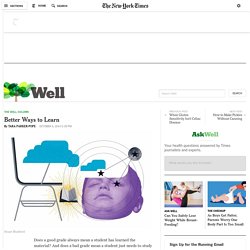
And does a bad grade mean a student just needs to study more? In the new book “How We Learn: The Surprising Truth About When, Where, and Why It Happens” (Random House), Benedict Carey, a science reporter for The New York Times, challenges the notion that a high test score equals true learning. He argues that although a good grade may be achieved in the short term by cramming for an exam, chances are that most of the information will be quickly lost. Indeed, he argues, most students probably don’t need to study more — just smarter. Mr. “Most of us study and hope we are doing it right,” Mr.
Donald Schon (Schön): learning, reflection and change. Contents: introduction · donald schon · public and private learning and the learning society · double-loop learning · the reflective practitioner – reflection-in- and –on-action · conclusion · further reading and references · links · how to cite this article Note: I have used Donald Schon rather than Donald Schön (which is the correct spelling) as English language web search engines (and those using them!)
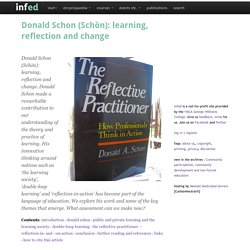
Often have difficulties with umlauts). About Bridget McKenzie. I’m working on an ambitious ongoing enquiry into learning, culture and ecology called The Learning Planet.
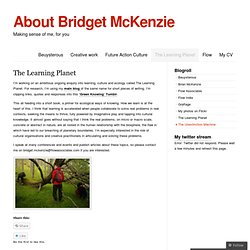
For research, I’m using my main blog of the same name for short pieces of writing. I’m clipping links, quotes and responses into this ‘Green Knowing’ Tumblr. This all feeding into a short book, a primer for ecological ways of knowing. How we learn is at the heart of this. I think that learning is accelerated when people collaborate to solve real problems in real contexts, seeking the means to thrive, fully powered by imaginative play and tapping into cultural knowledge. I speak at many conferences and events and publish articles about these topics, so please contact me on bridget.mckenzie@flowassociates.com if you are interested. What is a Community of Practice? Community of practice.
A community of practice (CoP) is a group of people who share a craft and/or a profession.
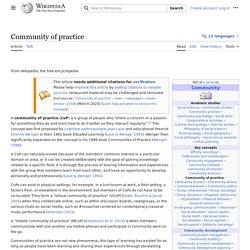
The concept was first proposed by cognitive anthropologist Jean Lave and educational theorist Etienne Wenger in their 1991 book Situated Learning (Lave & Wenger 1991). Wenger then significantly expanded on the concept in his 1998 book Communities of Practice (Wenger 1998). A CoP can evolve naturally because of the members' common interest in a particular domain or area, or it can be created deliberately with the goal of gaining knowledge related to a specific field. It is through the process of sharing information and experiences with the group that members learn from each other, and have an opportunity to develop personally and professionally (Lave & Wenger 1991). CoPs can exist in physical settings, for example, a lunch room at work, a field setting, a factory floor, or elsewhere in the environment, but members of CoPs do not have to be co-located.
Overview[edit] Origin and development[edit] Dweck.pdf. Redirecting. “It’s Like You’re Conducting an Orchestra” From the minute you meet Katie Brown, you get the feeling she’s an amazing teacher.
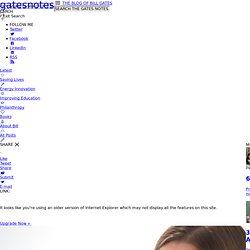
Her intelligence and passion jump out. You immediately think: I would love for my kids to be in her classroom. It’s no surprise to learn she was named the 2014 Washington State Teacher of the Year. Katie has had a busy summer meeting with policymakers, connecting with colleagues across the country, and even attending Space Camp with the top teachers from other states. So I really appreciated her taking the time to stop by my office last week. Katie teaches at Shuksan Middle School in Bellingham, a couple hours north of Seattle. A turnaround like that doesn’t happen overnight, of course, and there’s no one factor that causes it. “It’s Like You’re Conducting an Orchestra” Observations on Modernity - Niklas Luhmann. This collection of five essays by Germany’s most prominent and influential social thinker both links Luhmann’s social theory to the question “What is modern about modernity?”
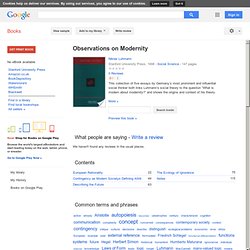
And shows the origins and context of his theory. In the introductory essay, “Modernity in Contemporary Society,” Luhmann develops the thesis that the modern epistemological situation can be seen as the consequence of a radical change in social macrostructures that he calls “social differentiation,” thereby designating the juxtaposition of and interaction between a growing number of social subsystems without any hierarchical structure. “European Rationality” defines rationality as the capacity to see the difference between systems and their environment as a unity.
Luhmann argues that, in a world characterized by contingency, rationality tends to become coextensive with imagination, a view that challenges their classical binary opposition and opens up the possibility of seeing modern rationality as a paradox. Creativity based learning: Wiriyah Ruechaipanit at TEDxChiangMai 2013. Heutagogy: spirals of reflection to empower learners in higher education - Reflective Practice - Volume 11, Issue 1.
▶ BBC Radio 4 - The Educators, Sir Ken Robinson.
ZEN PENCILS » 157. AMY POEHLER: Great people do things before they’re ready. Jacque Fresco. Mr.
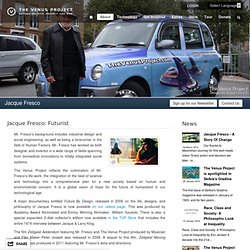
Fresco's background includes industrial design and social engineering, as well as being a forerunner in the field of Human Factors. Mr. Fresco has worked as both designer and inventor in a wide range of fields spanning from biomedical innovations to totally integrated social systems. Perspective to see the knowledge. Education principle. Www.comp.dit.ie/dgordon/Courses/ILT/ILT0004/TheTwoSigmaProblem.pdf. Learning to think/learn - literature review for analysing.
Learning skill - how to memorize / how to structure / how to thi. Learning by teaching. In professional education, learning by teaching (German: Lernen durch Lehren, short LdL) designates currently the method by Jean-Pol Martin that allows pupils and students to prepare and to teach lessons, or parts of lessons.
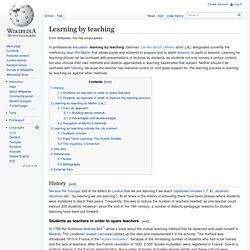
Learning by teaching should not be confused with presentations or lectures by students, as students not only convey a certain content, but also choose their own methods and didactic approaches in teaching classmates that subject. Neither should it be confused with tutoring, because the teacher has intensive control of, and gives support for, the learning process in learning by teaching as against other methods. History[edit] Seneca the Younger told in his letters to Lucilius that we are learning if we teach (epistulae morales I, 7, 8): docendo discimus (lat.: "by teaching we are learning"). At all times in the history of schooling there have been phases where students were mobilized to teach their peers. Students as teachers in order to spare teachers[edit]
Motivation-solution idea. Brain training. Professor David Chandler - Teaching. In the academic year 2013-14 Professor David Chandler will be teaching the following postgraduate modules at the Department of Politics and International Relations, University of Westminster, London.
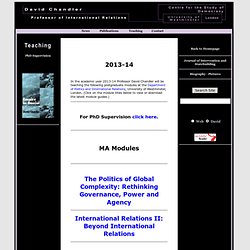
(Click on the module titles below to view or download the latest module guides.) For PhD Supervision click here. Charles University, Prague (December 2009) Intensive 6 session course, 'Debating Liberal Peace(building)' Overview: Today there appears to be a consensus that international peacebuilding missions have achieved limited success on the ground due to their liberal frameworks and practices. TROM Documentary : the reality of me. Human robot The player provides you with lots of helpful features;it remembers which video you watched and where you were in the video, it streams the videos from vimeo and the buttons to the left change the narrator's voice.
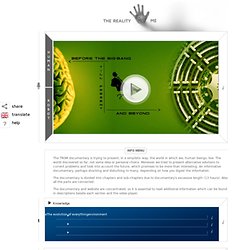
You can choose from the following two options:HUMAN - three voices with different accents.ROBOT - text readerSome may prefer the robot voice since it sounds a bit like AI, and it may give you the impression of a distant voice, analyzing the human species from distance;or some may prefer the warm, calm and sentimental voices of the human narrators with different accents which provide some diversity for such a long documentary.The language button for the website (left menu) will change the subtitle of the documentary as well if it exists, for example: if the documentary has been translated to Romanian and you choose Romanian for the website language the Romanian subtitle will be to added to the player as well.
The influence of e-learning on individual and collective empowerment in the public sector: An empirical study of Korean government employees. How to Use Persona Empathy Mapping. “No one cares how much you know, until they know how much you care”-Theodore Roosevelt Empathy: it’s a buzzword in the UX design world. Everybody’s doing it! But what exactly are they doing? There isn’t a quick “Empathy Filter” that we can apply to our work or our team, no formula to pump out results, and no magic words to bring it forth. There is, however, a simple workshop activity that you can facilitate with stakeholders (or anyone responsible for product development, really) to build empathy for your end users.
Empathy mapping helps us consider how other people are thinking and feeling. Image from Gamestorming. We add a twist to the technique by focusing on personas during post-synthesis workshops with our stakeholders. Happy learning: How innovative is a good grade? - PierreAntoine Ullmo. Posted by Pierre Antoine Ullmo in Education Today on Jun 26th, 2014 | 0 comments Is it all about grades? Over the last few weeks, millions of students around the world have taken their final exams, desperately struggling to attain good grades and access the universities of their choice. The Chinese Gaokao, the French Baccalauréat, the British A Level… are all symbolic of the hyper-competitive nature of our education systems.
At a time where innovative learning seems to be the only solution to improve our education systems, maybe it is worth wondering why these exams are not being questioned, and for which type of innovation they stand for. NYT and WSJ Bestselling Author of Drive. Kirsti Lonka / Principal Investigator - Publications - Research database Tuhat - University of Helsinki. Learning theory: models, product and process. Photo by Antenna on Unsplash Contents: introduction · what do people think learning is? · learning as a product · learning as a process · experience · reflective thinking · making connections · committing and acting · task-conscious or acquisition learning, and learning-conscious or formalized learning · the behaviourist orientation to learning · the cognitive orientation to learning · the humanistic orientation to learning · the social/situational orientation to learning · the constructivist/social constructivist orientation to learning · further reading · references · how to cite this article See, also, What is education?
Kurt Lewin: groups, experiential learning and action research. Contents: introduction · life · field theory · group dynamics · democracy and groups · t-groups, facilitation and experience · action research · conclusion · further reading and references · links. see, also : the groupwork pioneers series Kurt Lewin’s (1890-1947) work had a profound impact on social psychology and, more particularly for our purposes here, on our appreciation of experiential learning, group dynamics and action research.
Resource.1st.ir/PortalImageDb/ScientificContent/eae29e30-4f13-4016-8dc4-95f8ff7e1209/Future Shock.pdf. Class Schedule Maker. Gamification in Education - Learn. Theories for the digital age: Self regulated learning. LinkedIn. EdTech Themes in 2014. Eight key themes emerging from the buzz of edtech conference discussions. GUEST COLUMN | by Jennifer Corriero I recently had the opportunity to participate in conferences on educational technology including sxswEDU and DML (Digital Media and Learning). This video blog (see above) shares eight key themes that emerged for me as points of interest in the discussions that took place that can be summarized with the following key words:
Royal College of Art. Research into new tools, Technics and theories 1 (March 14) Phrenology. Educational psychology. Educational psychology is the study of human learning. The study of learning processes, both cognitive and affective, allows researchers to understand individual differences in behavior, personality, intellect, and self- concept. The field of educational psychology heavily relies on testing, measurement, assessment, evaluation, and training to enhance educational activities and learning processes.[1] This can involve studying instructional processes within the classroom setting.
Educational psychology can in part be understood through its relationship with other disciplines. Welcome - Work Learning Research. Catalog - Work Learning Research. Teach a man to fish - humorous alternatives. Share:
How learning [brain study, biology, psychology] Improve learning [current generation] Community-based participatory research. Rudolf Steiner. Austrian philosopher, social reformer, architect and esotericist. Maria Montessori. Maria Montessori and education. Maria Montessori.
Learning Pearltress. Denis46.